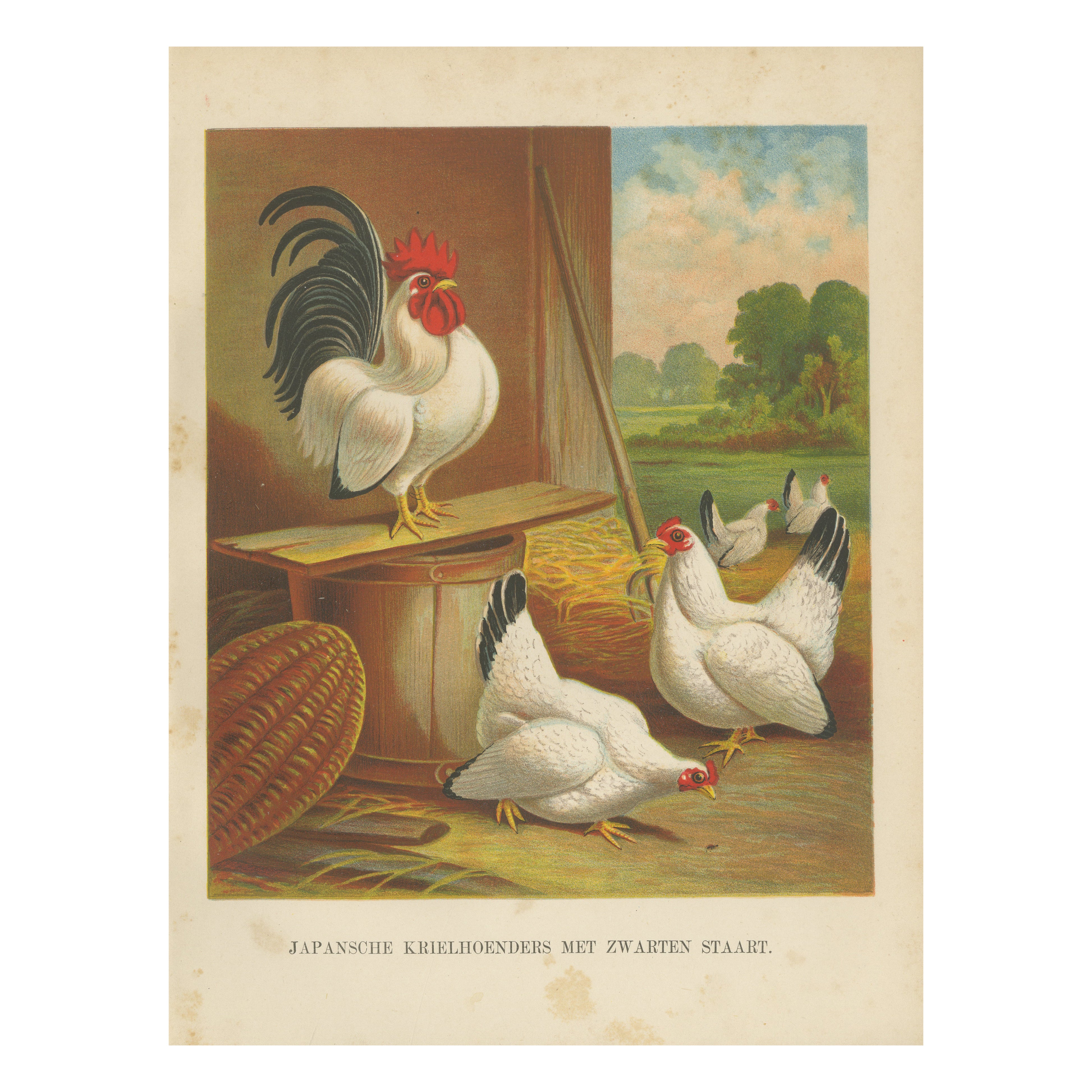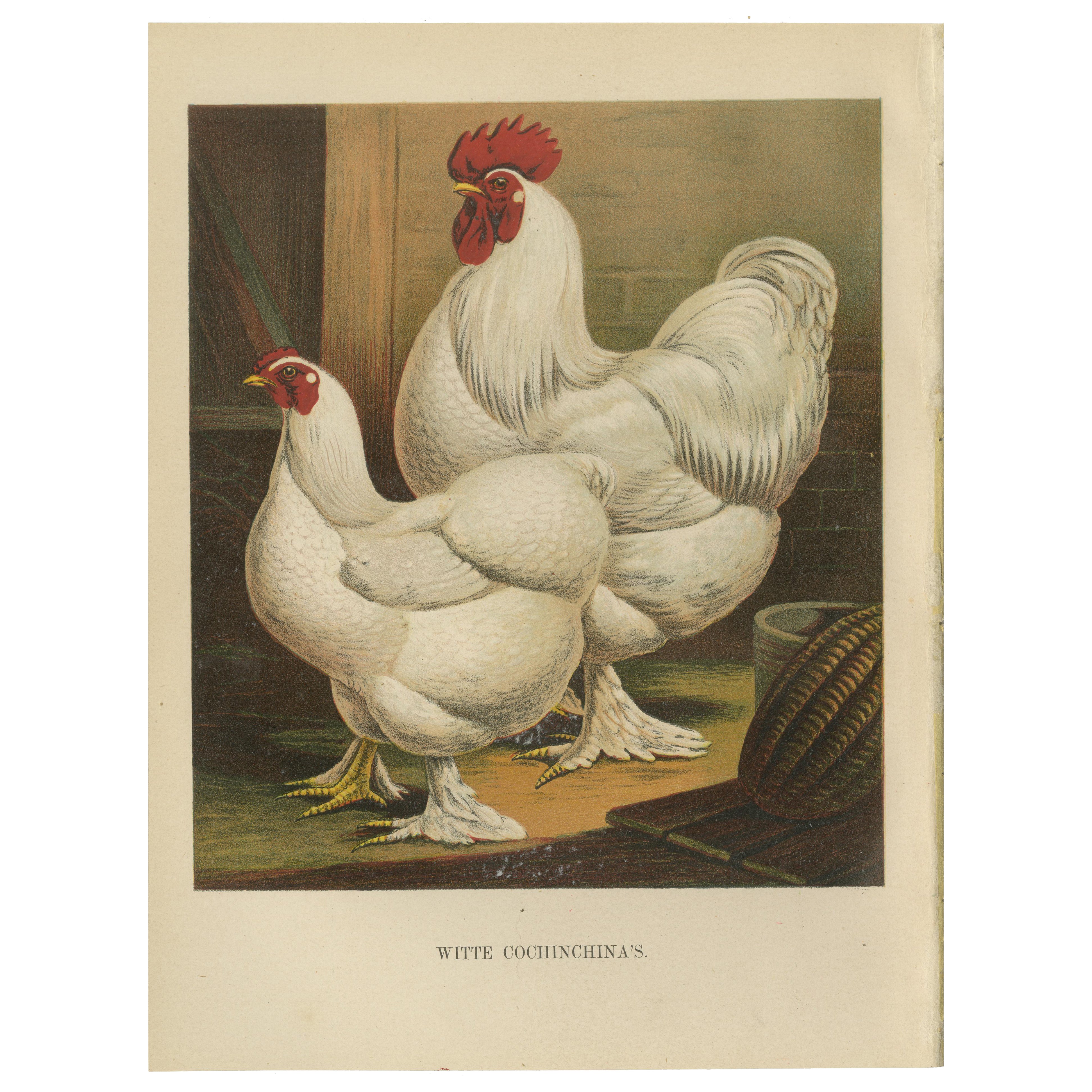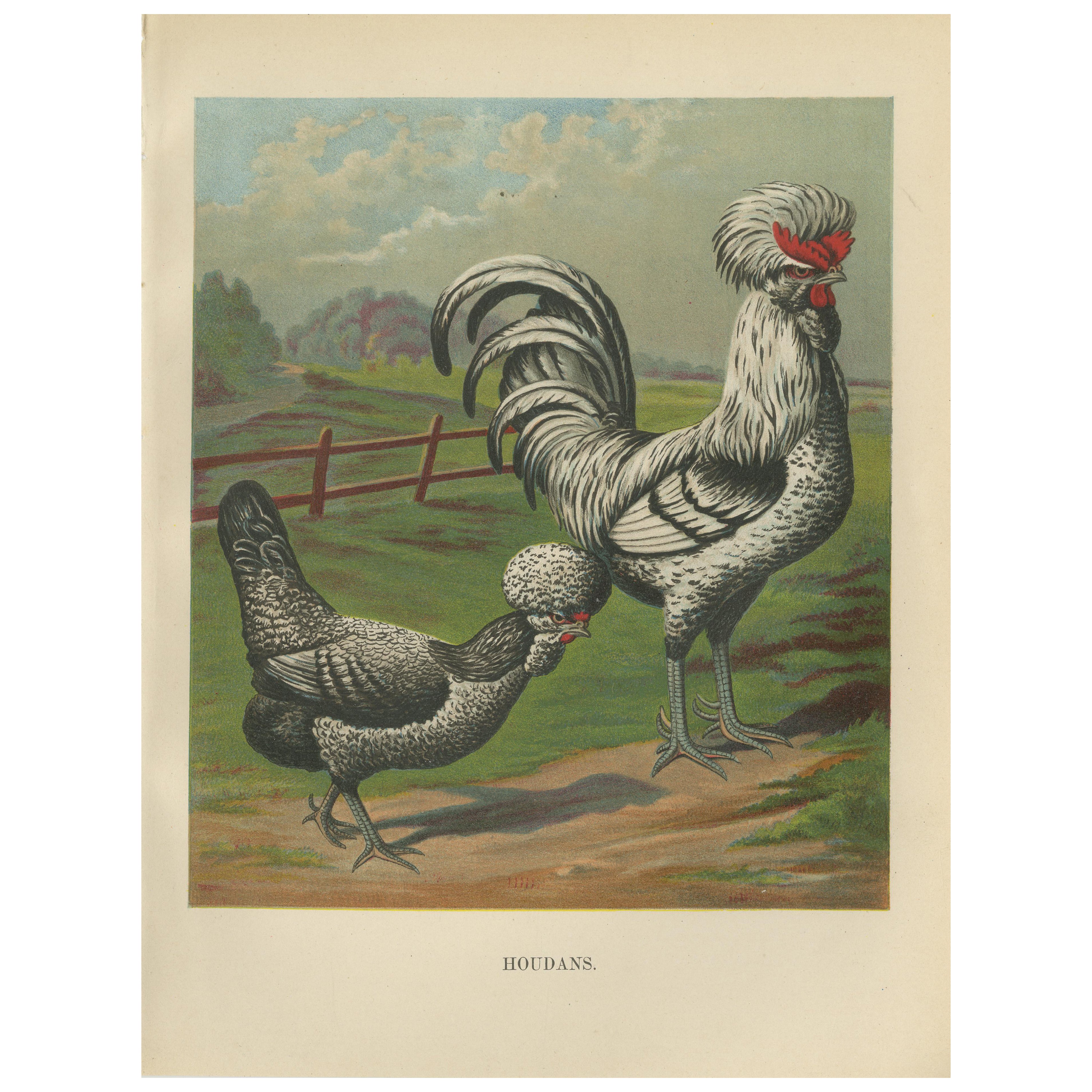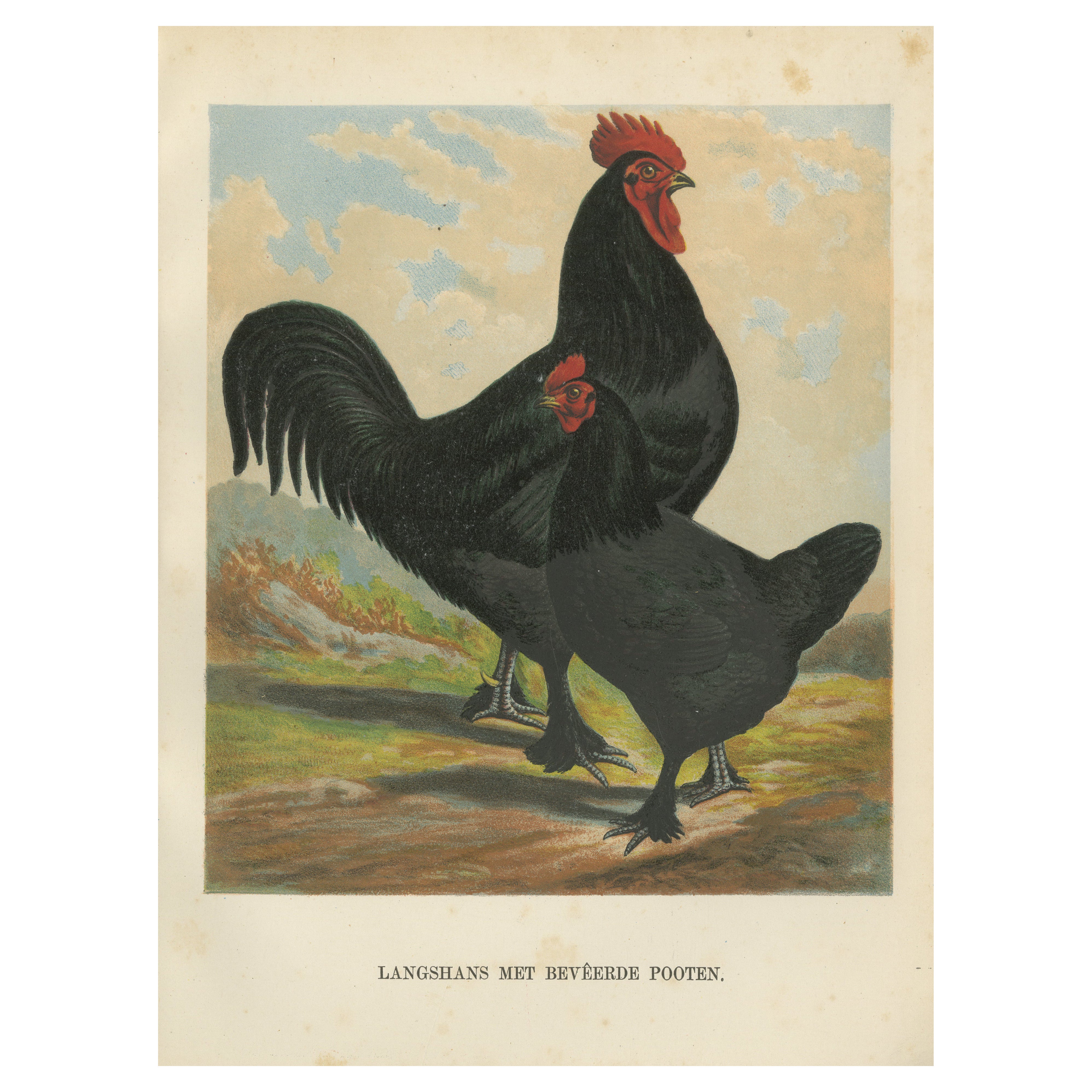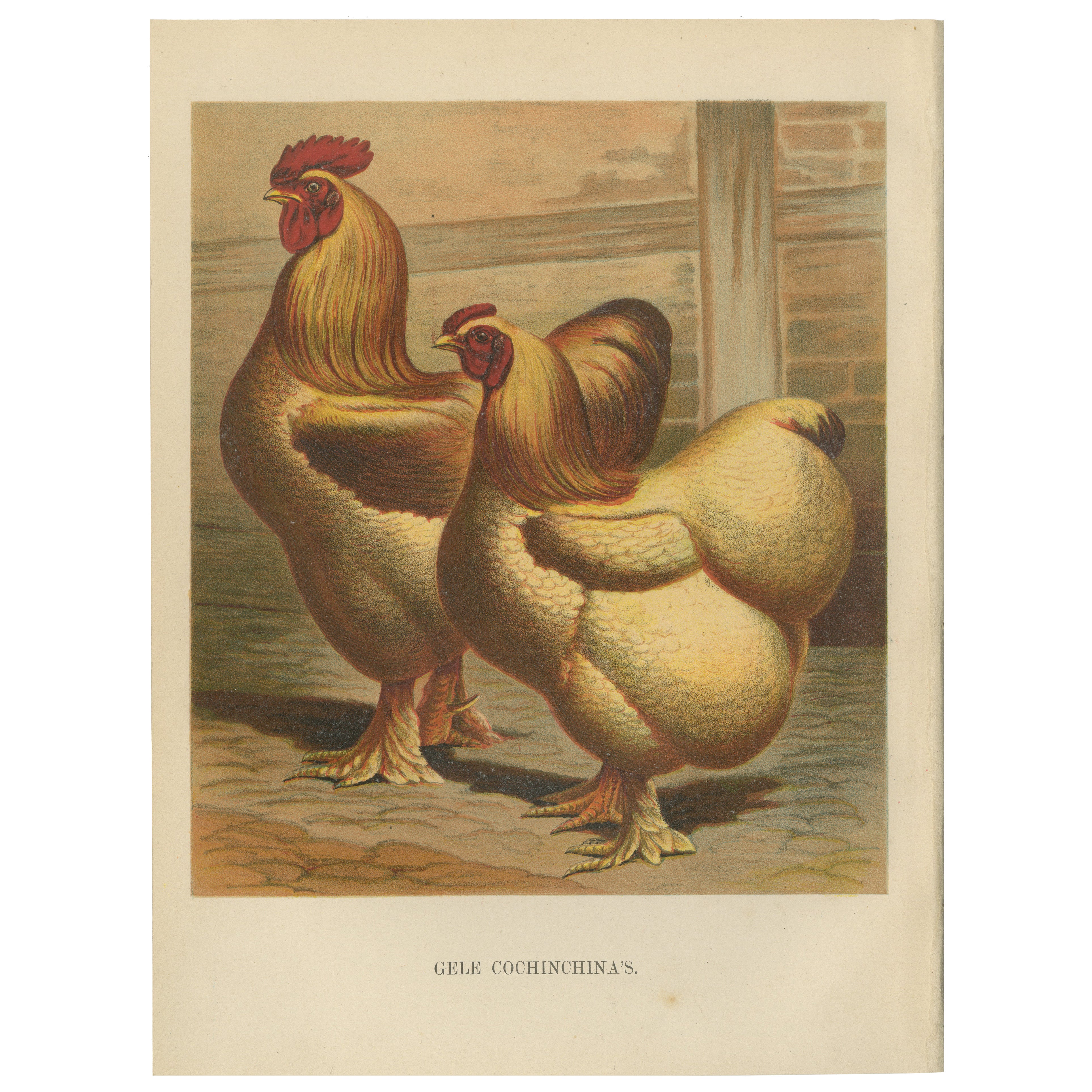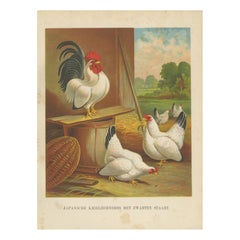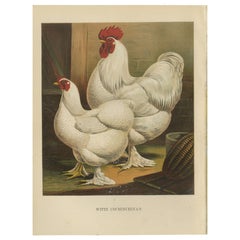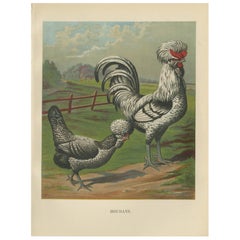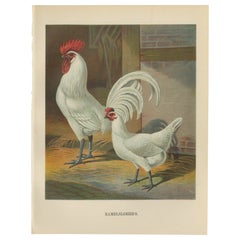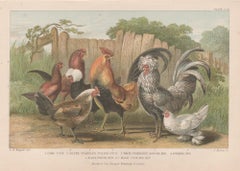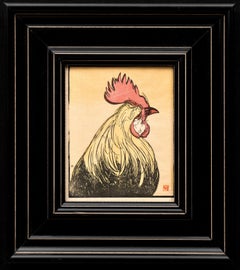Items Similar to The Enchanting Japanese Silkie Chicken - A Rare 19th Century Poultry Lithograph
Want more images or videos?
Request additional images or videos from the seller
1 of 10
The Enchanting Japanese Silkie Chicken - A Rare 19th Century Poultry Lithograph
$287.46
£213.02
€240
CA$392.43
A$436.57
CHF 228.85
MX$5,334.74
NOK 2,914.17
SEK 2,743.29
DKK 1,827.34
Shipping
Retrieving quote...The 1stDibs Promise:
Authenticity Guarantee,
Money-Back Guarantee,
24-Hour Cancellation
About the Item
The Enchanting Japanese Silkie Chicken A Rare 19th Century Poultry Lithograph
This exquisite 19th-century chromolithograph showcases a pair of Japanese Silkie chickens, a breed known for its distinctive soft, fur-like plumage and unique physical traits. The print, titled Japansche Zijdehoenders, originates from Geïllustreerd Hoenderboek, an Illustrated Poultry Book published in 1888 by Elsevier. Compiled by Julius Volschau and adapted for Dutch readers by Dr. A. C. Oudemans Jzn., this book provided a detailed study of poultry breeding, featuring both practical and ornamental breeds that were highly valued in the 19th century.
Silkie chickens have been prized for centuries, particularly in Asia, where they are believed to have originated. Marco Polo is said to have described a bird with the characteristics of the Silkie during his travels in China in the 13th century. Their most striking feature is their soft, silky plumage, which lacks the structure of normal feathers, giving them a fluffy appearance. Another defining trait is their black or dark blue skin and bones, along with five toes instead of the usual four found in most chicken breeds. Their gentle temperament makes them a favorite among poultry keepers, and they are still widely bred today for ornamental and pet purposes.
In this lithograph, the rooster stands tall with an elegant posture, his flowing tail feathers cascading behind him, while the hen presents a rounder, more compact form with an unmistakable crest of fluffy feathers atop her head. Their deep black facial features, including their comb and wattles, provide a stark contrast to their brilliant white plumage. The background setting in a rustic barnyard adds warmth and authenticity to the composition, making this print a true historical representation of the breed.
This lithograph was created using chromolithography, a highly advanced 19th-century printing process that allowed for vibrant, multi-colored illustrations. The artwork is based on an original drawing by Christian Förster, a skilled animal illustrator of the time. Chromolithography involved layering multiple colors, each applied with a separate stone plate, to achieve depth, shading, and fine detail. The rendering of the Silkies' unique feather texture and the subtle interplay of light and shadow in this lithograph highlights the artistry involved in this printing technique.
Condition Summary
The print remains in very good condition, with rich and well-preserved colors. Some minor age-related toning and light foxing are visible along the edges, which is common in lithographs from this period. The paper is stable with minimal signs of wear, making this an excellent collectible piece for antique poultry print enthusiasts and historical agricultural collectors.
Framing Tips
To best preserve and display this lithograph, consider the following framing techniques
- Use acid-free matting to prevent long-term deterioration. A soft cream or muted gray mat will complement the Silkies' unique feather texture and white plumage
- Choose UV-protective glass to safeguard the colors from fading due to light exposure
- A wooden frame in dark walnut, ebony, or antique gold will enhance the contrast between the soft plumage and the deep black facial features of the birds
- Float mounting can be used if the original paper edges are to be highlighted, adding a historical and museum-quality presentation
This lithograph is an exceptional example of 19th-century poultry illustration, capturing the beauty and intrigue of one of the most unique chicken breeds in history. Whether displayed in a farmhouse, study, or antique print collection, it remains a timeless and historically significant piece of agricultural art.
- Dimensions:Height: 10.63 in (27 cm)Width: 7.88 in (20 cm)Depth: 0.01 in (0.2 mm)
- Materials and Techniques:
- Period:
- Date of Manufacture:1888
- Condition:The print remains in very good condition, with rich and well-preserved colors. Some minor age-related toning and light foxing are visible along the edges, which is common in lithographs from this period.
- Seller Location:Langweer, NL
- Reference Number:Seller: BG-14012-331stDibs: LU3054344067482
About the Seller
5.0
Recognized Seller
These prestigious sellers are industry leaders and represent the highest echelon for item quality and design.
Platinum Seller
Premium sellers with a 4.7+ rating and 24-hour response times
Established in 2009
1stDibs seller since 2017
2,494 sales on 1stDibs
Typical response time: 1 hour
- ShippingRetrieving quote...Shipping from: Langweer, Netherlands
- Return Policy
Authenticity Guarantee
In the unlikely event there’s an issue with an item’s authenticity, contact us within 1 year for a full refund. DetailsMoney-Back Guarantee
If your item is not as described, is damaged in transit, or does not arrive, contact us within 7 days for a full refund. Details24-Hour Cancellation
You have a 24-hour grace period in which to reconsider your purchase, with no questions asked.Vetted Professional Sellers
Our world-class sellers must adhere to strict standards for service and quality, maintaining the integrity of our listings.Price-Match Guarantee
If you find that a seller listed the same item for a lower price elsewhere, we’ll match it.Trusted Global Delivery
Our best-in-class carrier network provides specialized shipping options worldwide, including custom delivery.More From This Seller
View AllJapanese Bantams with Black Tails - A Rare 19th Century Poultry Lithograph
Located in Langweer, NL
Japanese Bantams with Black Tails A Rare 19th Century Poultry Lithograph
This exquisite 19th-century chromolithograph, titled Japansche Krielhoenders met Zwarten Staart, depicts a...
Category
Antique 1880s Prints
Materials
Paper
The Elegant White Cochinchina - A Rare 19th Century Poultry Lithograph
Located in Langweer, NL
The Elegant White Cochinchina A Rare 19th Century Poultry Lithograph
This striking 19th century chromolithograph presents a pair of White Cochinchina chickens, a majestic breed ad...
Category
Antique 1880s Prints
Materials
Paper
The Distinguished Houdan Chicken - A Rare 19th Century Poultry Lithograph
Located in Langweer, NL
The Distinguished Houdan Chicken A Rare 19th Century Poultry Lithograph
This stunning 19th century chromolithograph showcases a pair of Houdan chickens, an elegant French breed kn...
Category
Antique 1880s Prints
Materials
Paper
The Distinguished Ramelsloher Chicken - A Rare 19th Century Poultry Lithograph
Located in Langweer, NL
The Distinguished Ramelsloher Chicken A Rare 19th Century Poultry Lithograph
This striking 19th-century chromolithograph features a pair of Ramelsloher chickens, a breed known for...
Category
Antique 1880s Prints
Materials
Paper
The Majestic Feathered Langshan - A Rare 19th Century Poultry Lithograph
Located in Langweer, NL
The Majestic Feathered Langshan A Rare 19th Century Poultry Lithograph
This striking 19th century chromolithograph showcases a pair of Langshan chickens with feathered legs, a hig...
Category
Antique 1880s Prints
Materials
Paper
The Majestic Golden Cochinchina: A Rare 19th-Century Poultry Lithograph
Located in Langweer, NL
The Majestic Golden Cochinchina A Rare 19th Century Poultry Lithograph
This exquisite 19th century chromolithograph features a pair of Golden Cochinchina chickens, an esteemed bre...
Category
Antique 1880s Prints
Materials
Paper
You May Also Like
Chicken and Hens - Original Lithograph - Late 19th Century
Located in Roma, IT
Image dimensions: 18 x 24,3 cm.
Chicken and Hens is a color lithograph contained in the Meyers Konversations-Lexikon (or Meyers Lexikon).
The print is from the encyclopedia Meyers ...
Category
Late 19th Century Animal Prints
Materials
Lithograph
Poultry, English antique bird engraving print, 1879
Located in Melbourne, Victoria
Poultry
Wood-engraving with original colouring. 1879.
160mm by 245mm (sheet).
Key below the image. From Oliver Goldsmith's 'A History of the Earth and Animated Nature'.
Category
Late 19th Century Victorian Animal Prints
Materials
Engraving
Chicken Family - Lithograph by W. French - Late 19th Century
Located in Roma, IT
A Chicken Family is an original print realized by William French (1815 ca.-1898) in the late 19th century.
Black and white lithograph. Original Title: ...
Category
Late 19th Century Animal Prints
Materials
Lithograph
Antique Rooster Woodblock Print circa 1910 by Prosper Alphonse Isaac
Located in SANTA FE, NM
Antique Rooster Portrait
Prosper Alphonse Isaac (France, 1858-1924)
Woodblock Print circa 1910
9 x 7 1/8 (15 1/4 x 17 frame) inches
The excellent book "The Great Wave: The Influence of Japanese Woodcuts on French Prints" which was an exhibition at The Metropolitan Museum of Art in 1974, recounts the phenomenal "cult of Japan" in late nineteenth-century France and reveals through direct comparisons its particular impact on the graphic work of Manet, Degas, Cassatt, Bonnard, Vuillard, Toulouse-Lautrec, and Gauguin. This print directly relates to the discovery of Japanese art most notably through the woodblock prints which found their way to the West oftentimes as stuffing or packing materials from consumer goods that were being imported to the West at the end of the 19th century.
Prosper-Alphonse Isaac was born in a well-to-do family. This gave him the means not only of leaving his native Calais to pursue a career as an artist in Paris, but also the means to acquire art. Isaac was particularly drawn to Japanese arts, which he collected avidly. Many of the objects he bought were eventually given to museums. As a printmaker Isaac started drawing seascapes in dry point, but eventually moved on to become one of only a handful of artists versed in color woodcut techniques in France. His compositions, generally small in scale, are heavily influenced by the arts of Japan. He printed small editions of these works. Aside from this artistic activity, Isaac was also an active textile decorator.
"This mark, which he borrows from Hokusaï and Totoya Hokkeï...
Category
1910s Art Nouveau Animal Prints
Materials
Ink, Laid Paper
Japanese Two Panel Screen: Chickens in a Millet Grove
Located in Hudson, NY
Japanese Two Panel Screen: Chickens in a Millet Grove, Meiji period (1868 - 1912) painting of a Japanese breed of chicken, Shamo chickens, in a millet grove. Beautifully painted and...
Category
Early 20th Century Japanese Meiji Paintings and Screens
Materials
Silk
Custom Framed Antique Rooster Engraving
By Georges-Louis Leclerc, Comte de Buffon
Located in Pearland, TX
Georges-Louis Leclerc, Count of Buffon (1707-1788) was a French naturalist, mathematician, and cosmologist. Buffon published thirty-six quarto volumes of his most well-known work, Hi...
Category
Antique 1850s French Decorative Art
Materials
Other
More Ways To Browse
Gold Chicken
Japanese Compact
White Fox Fur
Gray Fox Fur
Japanese Rooster
Japanese Comb
Chinese Comb
Chinese Blue And White Plate Bird
Polo Plates
Japanese Glass Floats
Antique Japanese Glass Floats
Rooster And Chicken Japanese
4 M Long Dining Tables
6 Foot Mirror
8 Panel Asian Screens
African Fertility Sculpture
African Head Rest
African Spears
